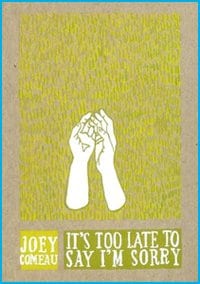I got sweet-talked into this one. With his usual charming exuberance, an intrepid local bookmonger recently pitched me about a dozen books in as many minutes. One of the titles I left with was this new story collection from Halifax-based Joey Comeau.
Comeau’s first book, the 2005 novel Lockpick Pornography, was a sex-and-gender bender peopled by hyperqueers thriving on guerilla action and highbrow theory. The narrator’s “property is theft” anarchism is essentially a vehicle for his primal need to fuck over all of nonqueer humanity: “The hetero-normative ownership paradigm is a tyrant belief system that deserves to be undermined on every front, from political protest to petty thievery.”
A skilled invader of homes, bodies and minds, this angry guy’s ownership critique covers everything from televisions to ideas of affectional and orientational entitlement. Sound a bit esoteric? In Comeau’s prose it’s anything but. His erotic terrorists are hell-raisers with a radical conscience and a wicked sense of humour.
That novel, operating outside convention and expectation, was a tough act to follow. The new story collection feels tame in comparison. The first story does reprise the unbounded sex play. The narrator is intent on having sex with famous authors, dead or alive. Patricia Highsmith is his latest ghostly conquest, with his seductive tactics including a quote from Kierkegaard: “The individual has manifold shadows, all of which resemble him, and from time to time have equal claim to be the man himself.” It struck me as a pretty good description of Comeau himself — at least the written evidence of him.
In “The Math Building” a woman secretly in love with a diminutive math teacher imagines explosive desire beneath her prim exterior. “When she wears glasses she looks so quiet, like a grenade with the pin still in.” A second math riff presents a tax accountant who succumbs to calculating sex with his client; the two do a mutual striptease, writing equations on each other’s bodies.
“The Machine” reveals a future where the real and the recorded are so entwined by rampant technology that there’s (virtually?) no distinction between past and present. A scientist and a priest walk into a bar. “I’m not telling this joke very well,” says the narrator. He starts again. The pair have been sent out by the Vatican to look for miracles, assisted by a historical playback machine that can scan any location for supernatural traces. The jokey sci-fi convolutions pretty much short-circuit the story arc in this one.
“XXX” is about a guy named Comeau whose father dies on a New Orleans balcony clutching a string of Mardi Gras beads. While dad expires, Comeau is across town visiting a cemetery with a female James Dean lookalike. “I told her I was Acadian.” In the graveyard they look at Comeau tombstones, “distant cousins, Cajuns to our Acadia.” The story has minimal plot but is full of feeling for Comeau’s ancestry, closing with a nod to the inevitable fading of past and parentage as vessels for identity.
“The Birthday Girl” opens deceptively with a conventional take on a teenage girl and her loving relationship with a grandmother about to turn 100. As midnight marks the start of the special day things take a macabre turn, then escalate quickly to pure horror. Comeau’s restraint makes for a subtle and creepy transition from ordinary realism to a ghastly nightmare world. Very spooky.
In “The Underwear Model” a guy who lives with a gal becomes infatuated with the image of an underwear model on his new box of briefs. He hops a train to New York and the head office of the undie maker in a hasty effort to connect with the yummy torso. The story feels too glib and cursory to generate much impact, simply leaving our incipient homo in a hotel room wondering whether to call his girlfriend.
Comeau cranks up the gratuitous quirkiness in “Giraffes and Everything,” about a disgruntled office worker who has reached his glass ceiling. Infatuated with the idea of giraffes, he learns that his boss’s office is crammed with giraffe knickknacks. He breaks in late at night and trashes the place with a coworker. The story feels like a cartoon storyboard — a concept unfinished.
A final story presents a old man in a futuristic nursing home, assessing his life and regrets via a rambling hallucinatory letter to his son. The dreamlike quality of the man’s world obscures more than reveals him as a character, though for me there were some intriguing echoes of William Burrough’s weird futuristic scenarios.
Joey Comeau reads at Toronto’s Writing Outside The Margins at 4:30pm on Sun, Aug 26.

 Why you can trust Xtra
Why you can trust Xtra


